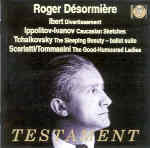In my review of Testament’s previous issue of Poulenc and Delibes ballets led by Roger Désormière (type Q6960 in Search Reviews) I noted that the Poulenc suffered from treble emphasis. All the selections on this new Désormière reissue in Testament’s worthy series were recorded at the same July, 1951 sessions as the Poulenc–in the same venue, Paris’ La Maison de la Mutualité, by the same producer, John Culshaw. To say they suffer sonic indignities similar to that Poulenc recording would be a gross understatement. Désormière’s performances are sabotaged by “hot” engineering that gives us papery strings and shrill trumpets, along with the electronic haze most noticeable in the Andante of Tommasini’s arrangement of Scarlatti harpsichord pieces. The net result is that if you’re planning to listen to this disc on a wide-ranging stereo system–don’t. A smaller, far more forgiving office system proved marginally more listenable. I can’t say how much of the problem relates to Decca’s original engineering and how much to a transfer that adds tons of digital hash to faulty originals. But whatever the cause, Désormière’s intentions are distorted by a bright veil of ear-piercing sound at anything above very moderate volume settings.
This is a shame because the music is enjoyable and Désormière is an expert ballet conductor. The Ibert is a hilarious satirical piece–the Valse movement a terrific sendup of old Vienna, the Parade movement a wonderful Offenbachian putdown of the military, the madcap Finale zinging it to everyone else–and Désormière leads it all with great panache. He masters the abundant charm of the Scarlatti pastiche too, but in the Caucasian Sketches I fail to hear what the booklet notes claim–that the “colors” emerge as “authentically Russian”. What actually emerges (if we must resort to these kinds of descriptions) is more like the sound-equivalent of colors redolent of French North Africa. Nor do the Gallic-tinted excerpts from Tchaikovsky’s Sleeping Beauty reveal sufficient insights to overcome the sonics. In sum, this is a disappointment, made all the more so because it’s a glaring (in both meanings of the word) exception to Testament’s usual fine transfers and sound.
































